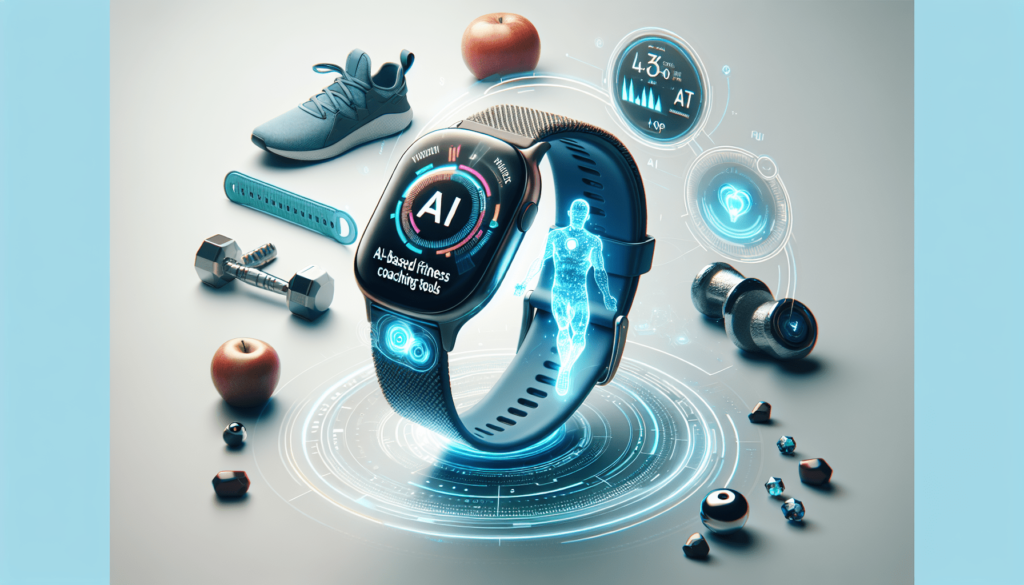Why did the computer go to the gym? To “work out” some issues with its programming, of course! But enough about computers’ lackluster workout routines—let’s talk about yours. Are you tired of missing your fitness goals because life is busier than a squirrel on caffeine? Enter AI-based fitness coaching tools, your new best friend in the quest for a healthier you. Now, I know what you’re thinking: “AI? Isn’t that the stuff that turns into robots and eventually plots world domination?” Rest assured, the only thing these AI-based tools are planning is your next workout.

Understanding AI-Based Fitness Coaching Tools
Think of AI-based fitness coaching tools as personal trainers who live inside your phone, minus the awkward eye contact and sweaty high-fives. They use artificial intelligence to provide personalized workout plans, track your progress, and even remind you to drink water because, let’s face it, you’re more likely to remember what your boss said at last year’s Christmas party than your daily hydration needs.
What Exactly Are These Tools?
These smart apps and devices use algorithms reminiscent of something out of a sci-fi movie to analyze data, such as your age, weight, fitness level, and exercise history. They then spit out workout routines tailored just for you, like a finely pressed pair of bespoke trousers for your biceps. It’s personal training for the digital age, and the best part is, these coaches won’t judge you if you use them in your pajamas—unless you ask them to, of course.
How Do They Work?
It’s like this: AI coaching tools gather data—like your heart rate, number of steps per day measured by your wearable device, or even how many times you’ve binge-watched your favorite sitcom instead of pressing play on your Pilates workout. They take this information, analyze it as meticulously as a cat analyzes the perfect place to nap, and adjust your fitness plan accordingly. Plus, many of these tools get smarter over time, learning from your performance or lack thereof (perhaps opening up a motivational chat when your yoga mat starts gathering dust).
The Benefits of Using AI in Your Fitness Routine
You might be skeptical about letting a bunch of codes and ciphers dictate your workout plan. After all, how could an algorithm know you want buns of steel like anything? But here’s where the fun begins: AI can actually surpass human trainers in many ways, and without the annoying habit of chatting about kale while you’re gulping for air.
Personalized Attention Without the Awkwardness
One of the excellent advantages of AI tools is personalized attention that doesn’t come with a side of judgment. Whether you’re a beginner who doesn’t know a bench press from a park bench or a seasoned athlete, these tools design workouts that suit your level. Plus, they scale according to your progress, adapting seamlessly as you become mightier than a Greek god or just manage to lift that weight off the ground—either way, the AI’s got your back.
Flexibility to Fit Your Lifestyle
Ever had to cancel a gym appointment because your life schedule is tighter than a pair of skinny jeans after holiday feasting? AI-based coaching offers the flexibility that’s as accommodating as your favorite pair of sweats. You can work out whenever, wherever, and the AI will adjust your plan like an elastic waistband.
Consistency Is Key
These digital coaches are designed to help keep you on track. They’re like having a fitness pal who cares about your goals as much as you do, holding you accountable with reminders and motivational tips—even on those days when your motivation levels are lower than a worm’s basement.
The Different Types of AI-Based Fitness Coaching Tools
Donning the attire of a savvy, technologically hip trainer, AI-based fitness technologies come in various forms. Each offers something a bit different—like ice cream flavors, but with fewer calories and no risk of freezer burn. Here are some categories setting the virtual gym alight.
Wearable Devices
Smart gadgets that you strap on your body for some high-quality fitness data collection. Think smartwatches, heart rate monitors, or fitness bands that record everything except the embarrassing noises you make during sit-ups.
Features and Uses
- Real-Time Data: Collects real-time data such as heart rate, steps, calories burned, and even your sleep patterns. Perfect for knowing exactly how much that late-night snack sabotage costs.
- Fitness Tracking: Offers insights into your fitness progress over time, useful for either celebrating your success or strategizing your next cheat day.
- Health Monitoring: Provides handy health metrics such as blood oxygen levels that only sound slightly less terrifying than they actually are.
Mobile Apps
Fitness apps are the bread and butter of AI-based coaching. Choose from a variety of app types based on your fitness goals, whether it’s weight loss, muscle-building, or becoming flexible enough to fold yourself into a carry-on suitcase.
Features and Uses
- Workout Plans: These apps offer tailored workout plans ranging from cardio and strength training to yoga, Pilates, and whatever they call ricocheting off a wall.
- Live Tracking and Feedback: Uses your phone’s capabilities to track your activity and give you real-time feedback. They’ll even applaud you (figuratively) for not tripping over your own feet.
- Diet and Nutrition Advice: Some apps double as mini dieticians, designing nutritious meal plans that don’t make you wish you were a rabbit.
At-Home Smart Equipment
Looking to upgrade your living room from a rogue yoga mat scene to a full-scale gym? At-home smart equipment provides AI-powered exercise routines with a click of a button. It’s like having gym equipment that’s magically more encouraging.
Features and Uses
- Smart Treadmills and Bikes: Offers interactive workouts and allows you to simulate hiking the Alps or biking through your neighborhood without risking insect inhalation.
- Virtual Trainers: Provides visual and audible guidance, ensuring that you know when to squat and when to please, for the love of muscles, rest.
How to Choose the Right AI-Based Tool for You
Choosing an AI-based fitness coaching tool may feel like choosing a new streaming series—overwhelming and rivaled only by the challenge of not spoiling your favorite shows. Here are some tips for picking the perfect digital workout buddy.
Your Fitness Goals
Knowing your fitness goals is like knowing what type of pizza you want to order—essential to avoid disappointment. Whether your aim is weight loss, muscle gain, or finally mastering that yoga pose that turns you into a human pretzel, pick a tool that’s aligned with these goals.
Budgetary Concerns
These tools can range from free to costing more than a small country’s GDP. Always consider what you’re willing to spend because, let’s face it, your bank account deserves some affection, too.
User Reviews and Recommendations
Just like you wouldn’t pick your next romantic partner based solely on an aggressive sales pitch, don’t select an AI tool without checking reviews. These insights can guide you like a lighthouse on a foggy night—or at least prevent customer remorse.
Trial Versions
Testing tools that offer trial versions are like tasting samples of a buffet before stuffing your plate—essential for finding out if it’s to your liking. See how the interface works, how smart the AI responds, and, most importantly, ensure it doesn’t crash like notoriously slow elevators during rush hour.

Potential Drawbacks and Challenges
All this talk might have you gung-ho for an AI coach, but let’s not put on rose-colored glasses. AI-based tools aren’t the magical cure to all your fitness woes. Here are a few challenges you might encounter.
Lack of Human Empathy
No matter how intelligent your AI tool may appear, it lacks human empathy. It won’t cheer you on with sincere excitement or lend a supportive nudge on particularly lazy days. The upside? It won’t roll its eyes at your questionable workout playlist.
Data Privacy Concerns
Just as you wouldn’t leave your diary open in public, consider what data you’re sharing with these services. Some require access to sensitive information that could lead to privacy concerns, or, worst of all, personalized ads for gym shorts.
Not Suitable for Everyone
An AI isn’t the perfect fit for everyone, much like how not everyone enjoys pineapple on pizza. Some might prefer the human touch and guidance that only a live, breathing trainer can offer.
Technology Glitches
Even the smartest tools can suffer hiccups—like breaking down mid-workout when you’ve finally worked up the energy to start. Always have a backup plan because sometimes technology can derail faster than a soap opera plot twist.
The Future of AI-Based Fitness Coaching Tools
Finally, we get to some crystal ball gazing. What does the future hold for AI-based fitness tools? In a word—exciting! With technology evolving faster than you can say “Asimov,” the prospects are as limitless as an open highway.
More Advanced Personalization
As AI becomes more advanced, expect significantly refined personalization features that could take into account your mood, stress level, and even the odd sock lying in your gym bag. You could be nailing that workout plan curated down to your sneezing schedule.
Integration with Other Health Technologies
Imagine a future where your AI coach chats harmlessly with your smart fridge, cautioning you against late-night cake feasts. Or an AI that syncs with wearable tech for holistic health monitoring, offering a digital health coach handier than a Swiss army knife.
Smarter, Affordable, and Accessible
The crème de la crème of AI fitness tools will eventually be affordable and accessible to everyone. So whether you’re a high-roller or a college student rummaging sofas for spare change, owning a smart assistant could be as routine as morning coffee.
So, it turns out the future is healthy, exciting, and maybe just a little bit judgmental… well, at least as long as AI judges you while you engage in a less-than-flattering jiggle of your tummy to some workout-induced bop. But remember, all that the AI tools want is to see you succeed, jump higher, and truly embody those buns of steel. And if this isn’t enough to convince you to skip that couch nap for a spin on the virtual treadmill, I don’t know what will.
